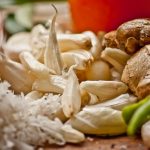List Of Herbal Remedies for a Good Night’s Sleep

Sleep is a fundamental aspect of overall health and well-being, yet millions of people worldwide struggle with sleep problems such as insomnia, restless sleep, or difficulty falling asleep. While there are various pharmaceutical sleep aids available, many individuals are turning to natural remedies like herbal solutions to improve their sleep quality.
In this article, we will explore a comprehensive list of herbs that have been traditionally used to help with sleep problems and discuss their potential benefits.
1. Valerian Root (Valeriana officinalis): Valerian root has earned a reputation as a go-to herbal remedy for sleep disorders due to its long history of use and potential benefits. This herb contains a variety of compounds, including valerenic acid, which are believed to contribute to its sleep-promoting effects.
a. Alleviating Anxiety and Promoting Relaxation: Valerian root is known for its anxiolytic (anxiety-reducing) properties. It can help calm the nervous system and reduce the feelings of anxiety and stress that often contribute to insomnia. By alleviating anxiety, it creates a more conducive environment for falling asleep.
b. Faster Sleep Onset: One of the key benefits of valerian root is its ability to help individuals fall asleep faster. It achieves this by increasing the availability of gamma-aminobutyric acid (GABA) in the brain, a neurotransmitter that has a calming effect on the nervous system.
c. Improved Sleep Quality: Beyond facilitating quicker sleep onset, valerian root is thought to enhance the overall quality of sleep. Users often report deeper and more restful sleep, which is crucial for waking up feeling refreshed and energized.
d. Safety and Considerations: Valerian root is generally considered safe for short-term use. However, long-term safety and potential interactions with certain medications have raised some concerns. It’s advisable to consult with a healthcare professional before using valerian root regularly or combining it with other medications.
2. Chamomile (Matricaria chamomilla): Chamomile, a delicate daisy-like herb with tiny white flowers and a gentle, apple-like aroma, has been cherished for its calming properties for centuries.
a. Apigenin and Mild Sedative Effects: Chamomile contains apigenin, a flavonoid known for its mild sedative and anxiolytic properties. Apigenin binds to specific receptors in the brain, helping to induce relaxation and reduce anxiety, which can pave the way for restful sleep.
b. Soothing Digestive Distress: Chamomile also aids in digestion, which can be especially useful for those whose sleep disturbances are related to discomfort caused by indigestion or gastrointestinal issues.
c. Herbal Teas and Tinctures: Chamomile is commonly consumed as a bedtime herbal tea or found in tincture form. The act of sipping warm chamomile tea alone can be soothing and ritualistic, setting the stage for a peaceful night’s sleep.
d. Allergy Considerations: Individuals with known allergies to plants in the Asteraceae family (like ragweed, marigolds, or daisies) should exercise caution when using chamomile, as it may trigger allergic reactions.
3. Lavender (Lavandula angustifolia): Lavender is a beloved herb not only for its pleasant fragrance but also for its potential to induce relaxation and reduce anxiety.
a. Aromatherapy: One of the most common ways to harness lavender’s sleep-promoting benefits is through aromatherapy. Lavender essential oil can be diffused in a room, added to a bath, or used in sachets placed near the pillow.
b. Reducing Anxiety: Lavender is known to have anxiolytic properties, which can help calm the mind and reduce the stress and anxiety that often hinder a good night’s sleep.
c. Improved Sleep Quality: Lavender’s calming effects may lead to deeper and more restorative sleep, which is essential for waking up feeling revitalized.
d. Gentle and Natural: Lavender is generally considered safe and non-habit-forming, making it an attractive option for those seeking natural sleep aids.
4. Passionflower (Passiflora incarnata): Passionflower is a beautiful, climbing vine known for its striking flowers and calming properties.
a. Traditional Anxiety and Insomnia Remedy: Passionflower has a long history of use in traditional herbal medicine for anxiety and sleep disorders. It is thought to work by increasing levels of GABA, a neurotransmitter that promotes relaxation.
b. Reducing Restlessness: For those experiencing restlessness before sleep or throughout the night, passionflower may help calm the mind and reduce the propensity to toss and turn.
c. Combining with Other Herbs: Passionflower is often combined with other herbs like valerian or lemon balm to create herbal blends that target various aspects of sleep disturbances.
d. Potential Drowsiness: While passionflower is generally considered safe, it can cause drowsiness, so it’s important to avoid activities that require alertness, such as driving, after taking it.
5. Lemon Balm (Melissa officinalis): Lemon balm is a fragrant herb belonging to the mint family and is celebrated for its calming properties.
a. Anxiety Reduction: Lemon balm’s gentle sedative properties can help reduce anxiety and promote relaxation, which can be especially beneficial for those with anxiety-related sleep issues.
b. Tea or Herbal Supplements: Lemon balm is commonly consumed as a tea or found in herbal supplements designed to support relaxation and sleep.
c. Combating Stress: Beyond its sleep benefits, lemon balm is often used to combat stress and nervousness, making it a versatile herb for overall well-being.
d. Potential for Gastrointestinal Relief: Some individuals may find relief from mild gastrointestinal discomfort when using lemon balm.
6. Ashwagandha (Withania somnifera): Ashwagandha is an adaptogenic herb with a long history in Ayurvedic medicine and is known for its ability to help the body adapt to stress.
a. Stress Reduction: Ashwagandha’s primary role is to reduce stress and anxiety, which can indirectly contribute to better sleep. By lowering stress levels, it becomes easier to relax and fall asleep.
b. Improved Sleep Patterns: Some studies suggest that ashwagandha may help regulate sleep patterns, leading to more consistent and restful sleep.
c. Enhancing Overall Well-Being: Ashwagandha offers a wide range of potential health benefits beyond sleep improvement, including immune support, increased energy, and mood enhancement.
d. Consultation is Advised: Individuals considering ashwagandha should consult with a healthcare professional, especially if they have underlying health conditions or are taking medications.
7. California Poppy (Eschscholzia californica): California poppy is a native North American plant that has been traditionally used for its mild sedative and anxiolytic properties.
a. Soothing Nerves: California poppy is known for its calming effects on the nervous system, which can be helpful for those dealing with anxiety-related sleep disturbances.
b. Mild Sedative: This herb is considered a mild sedative, making it a good choice for individuals seeking natural sleep aids without the risk of heavy sedation.
c. Non-Habit Forming: Unlike some pharmaceutical sedatives, California poppy is not habit-forming and does not induce dependency.
d. Suitable for Children: California poppy is often used for children who have difficulty falling asleep due to nervousness or restlessness.
8. Hops (Humulus lupulus): Hops are well-known as one of the primary ingredients in beer production, but they also have mild sedative properties that can be beneficial for promoting sleep.
a. Sedative Effects: Hops contain compounds such as humulone and lupulone, which have sedative and calming effects on the central nervous system. These compounds may help induce sleep and reduce restlessness.
b. Combining with Other Herbs: Hops are frequently combined with other herbs, such as valerian or chamomile, to create herbal blends that target various aspects of sleep problems. These combinations can enhance the overall effectiveness of the herbal remedy.
c. Reducing Sleep Latency: Hops may be particularly useful for individuals who struggle with sleep onset, as they can help reduce the time it takes to fall asleep.
d. Safe and Non-Habit Forming: Hops are generally considered safe and non-habit forming, making them a suitable choice for those seeking natural sleep aids.
9. Kava Kava (Piper methysticum): Kava kava, also simply referred to as kava, is a plant native to the South Pacific islands. It has been used for generations in traditional ceremonies for its relaxing and anxiety-reducing effects.
a. Anxiety Reduction: Kava is known for its potent anxiolytic properties. It can significantly reduce anxiety and promote a sense of calm, which can be particularly helpful for individuals dealing with anxiety-related sleep disturbances.
b. Muscle Relaxation: Kavalactones, the active compounds in kava, have muscle-relaxing properties, which can contribute to an overall sense of relaxation and ease before bedtime.
c. Caution and Potential Liver Toxicity: While kava has gained popularity for its calming effects, it should be used with caution due to concerns about potential liver toxicity. The use of kava has been associated with rare cases of liver damage. Therefore, it is crucial to consult with a healthcare professional before using kava and to follow recommended dosage guidelines.
10. Skullcap (Scutellaria lateriflora): Skullcap is a soothing herb with a long history of use in traditional herbal medicine. It is particularly known for its ability to calm the nervous system and promote relaxation.
a. Anxiety and Tension Reduction: Skullcap contains compounds that have anxiolytic properties, helping to reduce feelings of anxiety and tension. This makes it a valuable herb for individuals who struggle with sleep disorders related to stress and nervousness.
b. Supporting Restful Sleep: By calming the mind and body, skullcap may enhance the ability to fall asleep and enjoy a more restful night’s sleep.
c. Herbal Teas and Tinctures: Skullcap can be consumed as a tea or taken in tincture form, making it a flexible option for those seeking its sleep-promoting benefits.
11. Ginkgo Biloba (Ginkgo biloba): Ginkgo biloba is renowned for its potential cognitive benefits, but it may also indirectly contribute to improved sleep quality.
a. Enhanced Brain Function: Ginkgo biloba is believed to enhance blood circulation and oxygen flow to the brain. This improved brain function can result in better cognitive performance, including improved concentration and mental clarity.
b. Improved Sleep Patterns: When the brain functions optimally, it can help regulate sleep patterns, leading to more consistent and restful sleep.
c. Complementary to Sleep Hygiene: Ginkgo biloba is not a direct sedative but can be a valuable addition to a sleep routine when combined with other relaxation techniques and practices.
12. Catnip (Nepeta cataria): Catnip is often associated with its amusing effect on cats, but it also has mild sedative properties that can benefit humans.
a. Inducing Relaxation: Catnip can be brewed into a soothing tea that induces relaxation, making it a useful option for those seeking a natural way to unwind before bedtime.
b. Effective for Children and Infants: Catnip is particularly effective for children and infants who may experience restlessness or difficulty falling asleep. It can be a gentle and safe herbal remedy for young ones.
c. Soothing Digestive Discomfort: Like chamomile, catnip can help alleviate mild digestive discomfort that may interfere with sleep.
13. Holy Basil (Ocimum sanctum): Holy basil, also known as Tulsi, is considered an adaptogenic herb that can help the body adapt to stress and promote overall well-being.
a. Stress and Anxiety Reduction: Holy basil’s adaptogenic properties make it effective at reducing stress and anxiety, which are common contributors to sleep disturbances.
b. Consumed as a Tea: Holy basil is often consumed as a tea, which can be a relaxing and calming ritual before bedtime.
c. Immune Support: In addition to its potential sleep benefits, holy basil supports the immune system, which is essential for maintaining good health.
14. Linden (Tilia spp.): Linden, also known as lime blossom, is a tree with fragrant, delicate flowers known for their calming effects on the nervous system.
a. Promoting Relaxation: Linden flowers can be brewed into a tea that promotes relaxation and reduces anxiety, making it beneficial for those experiencing anxiety-related sleep disturbances.
b. Reducing Anxiety-Related Sleep Issues: By alleviating anxiety, linden can contribute to a better night’s sleep by creating a sense of calm and tranquility.
c. Mild Sedative Effects: Linden is considered a mild sedative and is generally well-tolerated by most individuals.
15. Chinese Skullcap (Scutellaria baicalensis): Chinese skullcap is an herb used in Traditional Chinese Medicine (TCM) to calm the mind and promote relaxation.
a. Traditional Use: Chinese skullcap has a long history of use in TCM for its ability to soothe the nerves and induce relaxation.
b. Consumed as a Tea or Supplement: Chinese skullcap can be consumed as a tea or taken as a supplement, making it a versatile option for individuals seeking sleep support.
c. Anxiety and Sleep: By calming the mind and reducing anxiety, Chinese skullcap may help individuals struggling with sleep disorders related to tension and stress.
16. Black Cohosh (Cimicifuga racemosa): Black cohosh is an herb often used by women experiencing sleep disturbances associated with menopause.
a. Menopausal Symptom Relief: Black cohosh is primarily known for its ability to alleviate hot flashes and night sweats, which can disrupt sleep patterns for menopausal women.
b. Supporting Hormonal Balance: By helping to regulate hormonal fluctuations during menopause, black cohosh indirectly promotes better sleep quality.
Conclusion
While herbs have been used for centuries to address sleep problems, it’s important to note that individual responses to herbal remedies can vary. Before incorporating herbs into your sleep routine, consider the following:
• Consult a healthcare professional, especially if you have underlying medical conditions, are pregnant or nursing, or are taking medications that may interact with herbs.
• Experiment with different herbs to find the one that works best for you. Some herbs may be more effective for specific sleep issues or personal preferences.
• Be patient. Herbal remedies often take time to show their full effects, and consistency in use is key.
• Consider other lifestyle factors that may impact your sleep, such as diet, exercise, and stress management.
Incorporating herbal remedies into your sleep routine can be a natural and gentle way to improve sleep quality and promote overall well-being. However, it’s essential to approach herbal remedies with an informed and cautious mindset, respecting their potential benefits and limitations.





